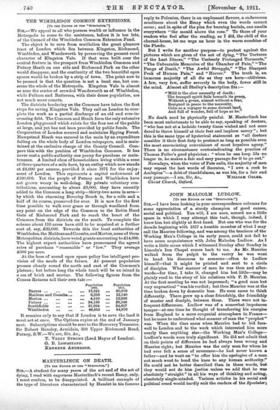MAETERLINCK ON DEATH.
[To THE EDITOR OP THE " SPECTATOR.") SIR,—A student for many years of the art and of the act of dying, I read with eagerness Maeterlinck's recent Essay, only, I must confess, to be disappointed. A brilliant example of the type of literature characterized by Hamlet in his famous
reply to Polonius, there is an unpleasant flavour, a cadaverous mustiness about the Essay which even the words cannot
cover; and in spite of the plea for burning burials, one smells everywhere "the mould above the rose." To those of your readers who feel after the reading, as I did, the chill of the charnel-house, let me urge an hour in the warm sunshine of the Plneclo.
But I write for another purpose—to protest against the pictures whiob are given of the act of dying, " The Tortures of the Last Illness," " The Uselessly Prolonged Torments."
"The Unbearable Memories of the Chamber of Pain," "The Pangs of Death," "The Awful Struggle," "The Sharpest Peak of Human Pain," and " Horror." The truth is, an immense majority of all die as they are born—oblivious. A few, very few, suffer severely in the body, fewer still in the mind. Almost all Shelley's description fits :—
"Mild is the slow necessity of death : The tranquil spirit fails beneath its grasp, Without a groan, almost without a fear, Resigned in peace to the necessity, Calm as a voyager to some distant land, And full of wonder, full of hope as he."
No death need be physically painful. M. Maeterlinck has been most unfortunate to be able to say, speaking of doctors,
"who has not at a bedside twenty times wished and not once dared to throw himself at their feet and implore mercy "; but this is the same type of hysterical statement as "all doctors
consider it their first duty to protract as long as possible even the most excruciating convulsions of most hopeless agony." There is no circumstance contraindicating the practice of Thomas Fuller's good physician " when he can keep life no longer in, he makes a fair and easy passage for it to go out."
Nowadays, when the voice of Fate calls, the majority of men may repeat the last words of Socrates, "I owe a cock to Asclepius "—a debt of thankfulness, as was his, for a fair and






































































 Previous page
Previous page